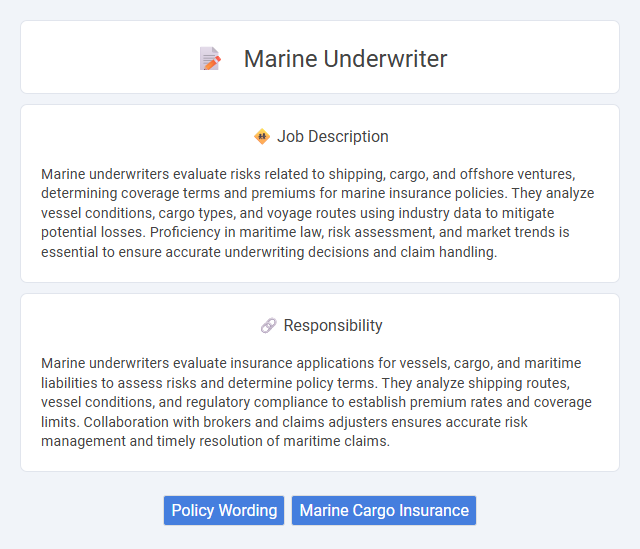
Marine underwriters evaluate risks related to shipping, cargo, and offshore ventures, determining coverage terms and premiums for marine insurance policies. They analyze vessel conditions, cargo types, and voyage routes using industry data to mitigate potential losses. Proficiency in maritime law, risk assessment, and market trends is essential to ensure accurate underwriting decisions and claim handling.
Individuals with strong analytical skills and attention to detail are likely well-suited for a marine underwriter position, where assessing risks related to shipping and cargo insurance is critical. Those comfortable with complex data and possess good communication abilities may find this role engaging and manageable. People who prefer predictable routines and minimal decision-making may struggle, as the job often requires quick evaluations and adaptability to changing maritime conditions.
Qualification
Marine underwriters typically require a bachelor's degree in finance, economics, or maritime studies to understand risk assessment in shipping and cargo insurance. Professional certifications such as Chartered Insurance Institute (CII) or Associate in Marine Insurance (AMI) enhance expertise in underwriting marine policies. Strong analytical skills, knowledge of maritime law, and experience with underwriting software are essential qualifications for accurate risk evaluation and premium calculation.
Responsibility
Marine underwriters evaluate insurance applications for vessels, cargo, and maritime liabilities to assess risks and determine policy terms. They analyze shipping routes, vessel conditions, and regulatory compliance to establish premium rates and coverage limits. Collaboration with brokers and claims adjusters ensures accurate risk management and timely resolution of maritime claims.
Benefit
A Marine underwriter job likely offers significant benefits such as competitive salaries, comprehensive health insurance, and retirement plans. Employees might also enjoy opportunities for professional development and the chance to work in an international, dynamic industry. Work-life balance and job stability could be additional advantages in this specialized underwriting field.
Challenge
A career as a marine underwriter likely involves navigating complex risks associated with shipping, cargo, and marine liabilities, which can pose significant analytical challenges. The probability of encountering unpredictable maritime conditions and regulatory changes may require constant adaptation and in-depth knowledge. This role often demands meticulous risk assessment to ensure accurate policy pricing and minimize potential losses.
Career Advancement
Marine underwriters specialize in assessing risks associated with shipping, cargo, and marine operations, providing a critical function within the insurance industry. Career advancement opportunities often include progressing to senior underwriter roles, risk management positions, or specialized sectors such as hull and cargo insurance or offshore energy. Gaining expertise in international maritime law, catastrophe modeling, and negotiation skills enhances prospects for leadership roles and cross-functional collaborations in global insurance firms.
Key Terms
Policy Wording
Marine underwriters specialize in assessing risks related to shipping, cargo, and marine liabilities, ensuring policy wording clearly defines coverage scope, exclusions, and claims procedures. Precise marine insurance policy wording includes terms addressing hull insurance, cargo insurance, protection and indemnity (P&I) coverage, and piracy risks. Effective policy wording reduces ambiguity, facilitates accurate risk assessment, and minimizes disputes during claim settlements in the maritime industry.
Marine Cargo Insurance
A Marine Underwriter specializing in Marine Cargo Insurance evaluates risks related to the transport of goods by sea, air, or land and determines appropriate coverage terms. Their expertise includes assessing shipping routes, cargo types, packaging standards, and potential perils such as piracy, weather damage, or theft. This role requires in-depth knowledge of international maritime laws, customs regulations, and insurance claim handling to mitigate financial losses for insurers and clients.
 kuljobs.com
kuljobs.com